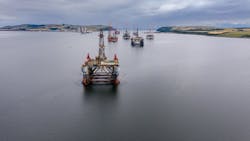Britain eases opposition to new oil, gas permits, but holds firm on taxes
Britain will allow some new oil and gas production on or near existing fields, the government said on Nov. 26, easing its stance on new licenses while dashing oil and gas producers’ hopes for an early end to windfall taxes on their sector.
The move, as reported by Reuters and Bloomberg, allows the government to hand out new oil and gas licenses if they do not require new exploration and link back to existing fields and infrastructure, the Department for Energy Security and Net Zero said.
But most notably, the UK North Sea oil and gas industry had hoped for an early end to the Energy Profits Levy (EPL), which is due to expire in March 2030.
However, when presenting its budget, the government announced no changes to one of the world’s toughest tax regimes for oil and gas producers, which includes a windfall levy of 38% when prices exceed government-set thresholds, bringing the overall tax burden in such circumstances to 78%.
Harbour Energy, a North Sea-focused producer, said it was disappointed in the announcement.
Brian Gilvary, Chairman of INEOS Energy, said: “The UK’s North Sea oil and gas industry has kept the lights on, heated homes and turned the wheels of industry for more than 50 years, but today’s decision by the UK Government to maintain the Energy Profits Levy at 78%, reverses that in a matter of minutes.
“The Energy Profits Levy is fundamentally flawed, and its impact is catastrophic. It was introduced as a windfall tax driven by a short-term post-covid surge in oil prices – but the temporary price surge justifying the levy has long passed, and yet the tax burden remains.
“Today’s decision leaves the UK with one of the least competitive fiscal regimes in the world for oil and gas investment, trading immediate tax gain for long-term and irreparable damage to the UK oil and gas industry. It will continue to drive capital overseas, stifle production, remove jobs, and increase dependence on overseas oil supplies.
“The UK Government should have been bold, this was an opportunity to signal confidence in UK manufacturing, but today we have seen the opposite is true.”
The Offshore Energies UK industry group also criticized the decision. “The future of North Sea energy depends on investment, which won’t come without urgent reform of the windfall tax,” said David Whitehouse, head of the OEUK. “If the levy stays in place beyond 2026, projects will stall and jobs will vanish, no matter how pragmatic licensing policy becomes.”
Britain’s gas output is falling faster than demand, and its domestic oil production has also fallen faster than demand. From an output of around 4.4 million barrels of oil equivalent per day (boed) at the start of the new millennium, Britain now produces around 1 million boed, with a decline to under 150,000 boed seen by 2050, according to UK oil and gas regulator North Sea Transition Authority (NSTA).
The government has vowed to use the revenue from oil and gas to raise funds for renewable energy projects.
While oil prices have fallen below a government-set threshold for the so-called Energy Profits Levy (EPL), gas prices have been above it. The windfall tax is disabled once both fall below their thresholds, which are regularly updated.
The government said on Wednesday that the EPL would be replaced in March 2030 with an Oil and Gas Price Mechanism at a rate of 35%, which would apply if oil and gas prices stay above certain thresholds.
About the Author
Bruce Beaubouef
Managing Editor
Bruce Beaubouef is Managing Editor for Offshore magazine. In that capacity, he plans and oversees content for the magazine; writes features on technologies and trends for the magazine; writes news updates for the website; creates and moderates topical webinars; and creates videos that focus on offshore oil and gas and renewable energies. Beaubouef has been in the oil and gas trade media for 25 years, starting out as Editor of Hart’s Pipeline Digest in 1998. From there, he went on to serve as Associate Editor for Pipe Line and Gas Industry for Gulf Publishing for four years before rejoining Hart Publications as Editor of PipeLine and Gas Technology in 2003. He joined Offshore magazine as Managing Editor in 2010, at that time owned by PennWell Corp. Beaubouef earned his Ph.D. at the University of Houston in 1997, and his dissertation was published in book form by Texas A&M University Press in September 2007 as The Strategic Petroleum Reserve: U.S. Energy Security and Oil Politics, 1975-2005.

